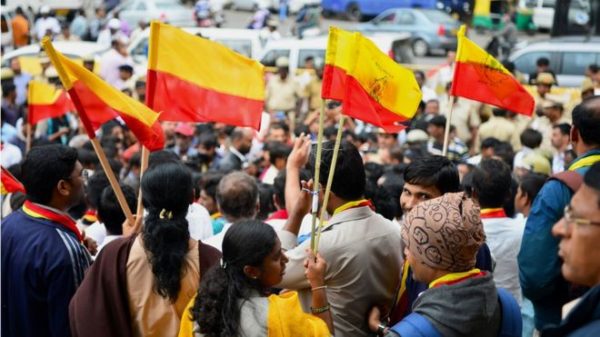The government in the southern Indian state of Karnataka recently set up a panel to explore if the state can have its own separate flag. The BBC explains why it has become such a contentious issue.
A ‘Kannada flag’
The state has had an unofficial ‘Kannada flag’ since the 1960s – the red-and-yellow flag is popular with the local people and many Kannada activists also wear it as a scarf. [The people and also the official language of Karnataka is called Kannada.]
It is not used during national ceremonies like Republic Day or Independence Day, but people hoist it across the state on 1 November every year to mark the day the state was formed.
For years, there has been a demand to recognise it as the state’s official flag.
Last month, the Congress party-led state government constituted a nine-member panel, including bureaucrats and academics, to advice on the legality of the issue and also suggest a design for the state flag.
What’s the problem?
The only state so far to have a separate official flag is Jammu and Kashmir, which enjoys special status under the Indian constitution.
The Karnataka government’s decision to form a committee to look into the demand is a departure from the stand taken by the state’s earlier BJP (Hindu nationalist) government.
In 2012, the state was ruled by the BJP and the then government had rejected a similar demand saying that having a separate flag would be “against the unity and integrity of the country”.
And earlier this week, India’s federal government again insisted that there was no provision in the constitution for a separate flag for any state.
“We are one nation, one flag. Legally there is no provision either for providing or prohibiting a separate flag for any state,” Press Trust of India quoted a home ministry spokesperson as saying.
Karnataka Chief Minister Siddaramaiah, however, has questioned if there is any provision in the constitution which prohibits the state from having its own flag.
“Is there any provision in the constitution prohibiting a state from having its own flag? Has the BJP come across any such provision in the constitution? Let them say that they do not want a flag for Karnataka,” he said.
Is it politically driven?
Many in Karnataka say the controversy is driven by the fact that the state assembly elections are due next year and the Congress government is trying to endear itself to the local population, says BBC Hindi’s Imran Qureshi in Bangalore.
Mr Siddaramaiah, however, has denied that this has anything to do with the polls. “Elections are in May,” he said, suggesting that they were still sometime away.
But, off the record, even his party colleagues say the move may be politically motivated.
“By having a regional flag, no disrespect is being shown to the national flag. The Karnataka flag will naturally fly below the national flag. But yes, there are political implications of this regional sentiment being raised in an election year,” a senior Congress party leader said.
How does the world deal with this issue?
Most countries around the world that follow a federal system allow regional flags.
Dr Sandeep Shastri, political analyst and Pro-Vice Chancellor at Bangalore’s Jain University, says countries like the Unites States, Germany, Australia and Myanmar (Burma) allow different regions to have a different regional flag to show their distinct identity.
“Importance to a regional flag does not mean rejection of the national flag. This is an issue of local identity. Unfortunately, the debate is not taking into account the diversity of our country, but is only focussed on unity.
“In a country like India, diversity is unity. Unity cannot have a strong base without diversity,” Dr Shastri said.






Leave a reply